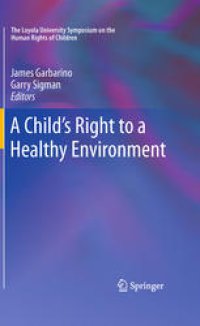
Ebook: A Child's Right to a Healthy Environment
- Tags: Child and School Psychology, Education (general), Medicine/Public Health general, Social Work, Psychiatry, Pediatrics
- Series: The Loyola University Symposium on the Human Rights of Children 1
- Year: 2010
- Publisher: Springer-Verlag New York
- Edition: 1
- Language: English
- pdf
It’s a startling reality that more American children are victims—and perpetrators—of violence than those of any other developed country. Yet unlike the other nations, the United States has yet to ratify the United Nations Convention on the Rights of the Child. Compelling, readable, and interdisciplinary, A Child’s Right to a Healthy Environment provides an abundance of skilled observation, important findings, and keen insights to place children’s well-being in the vanguard of human rights concerns, both in the United States and globally.
Within this volume, authors examine the impediments to the crucial goals of justice, safety, dignity, well-being, and meaning in children’s lives, factors as varied as socioeconomic stressors, alienated, disengaged parents, and corrosive moral lessons from the media. The complex role of religious institutions in promoting and, in many cases, curtailing children’s rights is analyzed, as are international efforts by advocates and policymakers to address major threats to children’s development, including:
- War and natural disasters.
- Environmental toxins (e.g., malaria and lead poisoning).
- The child obesity epidemic.
- Gun violence.
- Child slavery and trafficking.
- Toxic elements in contemporary culture.
A Child’s Right to a Healthy Environment is a powerful call to action for researchers and professionals in developmental, clinical child, school, and educational psychology as well as psychiatry, pediatrics, social work, general and special education, sociology, and other fields tasked with improving children’s lives.
It’s a startling reality that more American children are victims—and perpetrators—of violence than those of any other developed country. Yet unlike the other nations, the United States has yet to ratify the United Nations Convention on the Rights of the Child. Compelling, readable, and interdisciplinary, A Child’s Right to a Healthy Environment provides an abundance of skilled observation, important findings, and keen insights to place children’s well-being in the vanguard of human rights concerns, both in the United States and globally.
Within this volume, authors examine the impediments to the crucial goals of justice, safety, dignity, well-being, and meaning in children’s lives, factors as varied as socioeconomic stressors, alienated, disengaged parents, and corrosive moral lessons from the media. The complex role of religious institutions in promoting and, in many cases, curtailing children’s rights is analyzed, as are international efforts by advocates and policymakers to address major threats to children’s development, including:
- War and natural disasters.
- Environmental toxins (e.g., malaria and lead poisoning).
- The child obesity epidemic.
- Gun violence.
- Child slavery and trafficking.
- Toxic elements in contemporary culture.
A Child’s Right to a Healthy Environment is a powerful call to action for researchers and professionals in developmental, clinical child, school, and educational psychology as well as psychiatry, pediatrics, social work, general and special education, sociology, and other fields tasked with improving children’s lives.